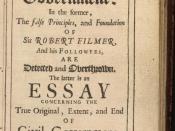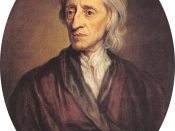English political theorist, John Locke focuses primarily on the framework of justifiable and workable government, all other issues and ideas as they relate to humanity can be explained and elaborated upon in that relationship. Locke also establishes the issues and viability relating to virtue. Almost the entire key members of the intellectual activity of the eighteenth century in England leads back to Locke. Locke was able to concisely describe and honor the Enlightenment in his belief in the middle class and its right to freedom of conscience and right to property, in his faith in science, and in his confidence in the goodness of humanity. His influence upon philosophy and political theory has been immense.
Jean Jacques Rousseau was born in Switzerland but spent the majority of his life in France. Rousseau stresses, as does John Locke, the idea of a social contract as the basis of society. Locke's version emphasized a contact between the governors and the governed: Rousseau's was in a way much more profound - the social contract was between all members of society, and essentially replaced "natural" rights as the basis for human claims.
John Locke . . . Concerning Human Understanding
In the Essay Concerning Human Understanding, Locke carefully reviews the characteristics of the human mind and the course by which it is aware of the world outside and around it. Arguing against the long-established proposition of intrinsic ideas, Locke believed that the mind is born blank, a tabula rasa upon which the world describes itself through the experience of the five senses. Knowledge arising from sensation is perfected by reflection, thus enabling humans to arrive at such ideas as space, time, and infinity. Locke also believed that all persons are born good, independent, and equal just as nature itself is both good, independent...


